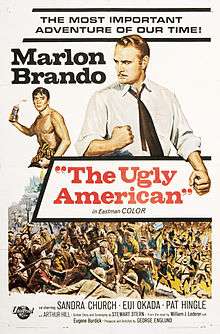The Ugly American (film)
The Ugly American is a 1963 American adventure film directed by George Englund, written by Stewart Stern, and starring Marlon Brando, Sandra Church, Eiji Okada, Pat Hingle, Judson Pratt and Arthur Hill. It is based on the 1958 novel The Ugly American by Eugene Burdick and William Lederer. The film was released on April 2, 1963, by Universal Pictures.[2][3][4]
| The Ugly American | |
|---|---|
 Theatrical release poster by Renato Fratini | |
| Directed by | George Englund |
| Produced by | George Englund |
| Screenplay by | Stewart Stern |
| Based on | The Ugly American by Eugene Burdick William Lederer |
| Starring | |
| Music by | Frank Skinner |
| Cinematography | Clifford Stine |
| Edited by | Ted J. Kent |
Production company | Universal Pictures |
| Distributed by | Universal Pictures |
Release date |
|
Running time | 120 minutes |
| Country | United States |
| Language | English |
| Box office | $3,500,000[1] |
Premise
American ambassador Harrison MacWhite (Marlon Brando) travels to a Southeast Asian country beleaguered by rival factions, but MacWhite views the political situation only in the simplest terms: as a struggle between communism and democracy. By the time that the ambassador finally sees the resultant political upheaval as something far more complicated, it may be too late.
Cast
- Marlon Brando as Ambassador Harrison Carter MacWhite
- Eiji Okada as Deong
- Sandra Church as Marion MacWhite
- Pat Hingle as Homer Atkins
- Arthur Hill as Grainger
- Jocelyn Brando as Emma Atkins
- Kukrit Pramoj as Prime Minister Kwen Sai
- Judson Pratt as Joe Bing
- Reiko Sato as Rachani, Deong's Wife
- George Shibata as Munsang
- Judson Laire as Senator Brenner
- Philip Ober as Ambassador Sears
- Yee Tak Yip as Sawad, Deong's Assistant
- Carl Benton Reid as Senator at Confirmation Hearing
- Simon Scott as Johnson
- Frances Helm as TadRed
- James Yegi as Berg
- John Daheim as Her (as John Day)
- Bill Stout as Tyler, NBC Reporter
- Stefan Schnabel as Andrei Krupitzyn
Production and screenplay
The film version of the novel was made in 1963 and starred Marlon Brando as Ambassador Harrison Carter MacWhite.
The screenplay was written by Stewart Stern, and the film was produced and directed by George Englund. The film was shot mainly in Hollywood, with Thailand serving as the inspiration for the background sceneries. Parts of the film were also shot on locations in Bangkok, Thailand, including at Chulalongkorn University, one of the leading institutes of higher learning of the country.
Critical reaction
The Ugly American received mixed reviews and was completely overwhelmed by a number of more popular films that year.[5] The film won no Golden Globes and was not nominated for an Oscar. It did poorly at the box office and was not among the year's top 25 grossing films of 1963.[6]
The New York Times reported that Brando “moves through the whole picture with authority and intelligence,” and the New York Daily News said it was “one of Brando’s best performances.” But the negative view was reflected by the critic in Time who wrote that Brando “attempts an important voice but most of the time he sounds like a small boy in a bathtub imitating Winston Churchill” and called it a “lousy picture.”[7]
Review aggregator Rotten Tomatoes reports that 80% of critics have given the film a positive review, with a rating average of 6.1/10.[8]
Of twenty-three reviews examined by historian Jon Cowans,[7] fourteen were positive, five negative, and four neutral or mixed. Brando had given interviews where he questioned American Cold War politics, and some reviewers agreed, but few of these reviews mentioned that the film was set in a country very much like Vietnam. Only a few mentioned the point that, as The Dallas Morning News put it, one should “not assume that nationalism is inevitably anti-American,” and The New Republic was unusual in adding that “American blindness ... has driven many people particularly Asians, towards communism.” Some called Senator Brenner the real “ugly American” and objected to his McCarthyite tactics. The New York Post wrote that the film presented the dilemma that when Americans supported dictators, the Communists “make common revolutionary cause with the downtrodden.” Many East Coast reviews, however, objected to the film’s “oversimplification” of the issues. The Washington Post wrote it was “nothing more than a western about the bad guys and the good guys.”[7]
Political impact
Kukrit Pramoj, a Thai politician and scholar, was hired as a cultural expert/advisor to the film and later played the role of Sarkhan's Prime Minister "Kwen Sai". Later on, in 1975, he, in fact, became the 13th Prime Minister of Thailand. Probably because of this, the word "Sarkhan" entered the Thai language as a nickname of Thailand itself, often with a slight self-deprecating or mocking tone.[9] Much of the 'Sarkhanese' spoken in the film is actually Thai.
References
- "Top Rental Films of 1963", Variety, 8 January 1964 p 37. Please note this figure is film rentals accruing to distributors, not gross takings.
- Crowther, Bosley (1963-04-12). "Movie Review - The Ugly American - Screen:'The Ugly American' Opens:Marlon Brando Stars as the U.S. Diplomat". NYTimes.com. Retrieved 2015-12-19.
- "The Ugly American (1963) - Overview". TCM.com. Retrieved 2015-12-19.
- "The Ugly American". Afi.com. 1963-05-05. Retrieved 2015-12-19.
- Stefan Kanfer (7 July 2011). Somebody: The Reckless Life and Remarkable Career of Marlon Brando. Faber & Faber. p. 187. ISBN 978-0-571-27878-7.
- "Top Grossing Films of 1963". 2013-09-06. Retrieved 2015-05-18.
- Cowans, Jon (2010). "A Deepening Disbelief: The American Movie Hero in Vietnam, 1958-1968". Journal of American-East Asian Relations. 17 (4): 324–351. doi:10.1163/187656111x564306.CS1 maint: ref=harv (link), p. 333-339.
- The Ugly American at Rotten Tomatoes
- Rithdee, Kong (2015-01-31). "Don't blame Americans for bad acting". BangkokPost.com. Retrieved 2018-06-01.